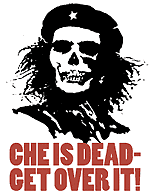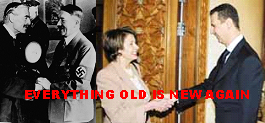
-
Syndicate this site (XML)
Powered by
Movable Type 2.64
Design by



August 16, 2007
Pimpin' Ain't Easy!
Tomorrow is my last day subbing for Pam - cue cheering, applause, and calls of "It's about time. You suck!" - but before I go, I wanted to bring a little of my blog over here. Besides, Blogmeister USA has a classy audience that wouldn't be caught dead at my slum. This is a little thing I like to call "Link Pimping." Enjoy!
Reverse Vampyr also delves into the Padilla case . . . and gets a troll for his efforts.
Aaron at Lifelike Pundits has the funniest Michael Vick story . . . ever! If half of it is true, then it's worth your attention.
Third Wave Dave remembers The King. Um, it's Elvis, not Richard Petty.
Brainster explains why all is not sunshine and lollipops for Ron Paul. Was it ever?
And, finally, my friend Captain America remembers one of the worst days in the history of the Philadelphia Fire Department.
Wyatt Earp
Show Comments »
January 17, 2006
A Study of the French Elites
Ever wonder how France gets saddled with the leaders it has? My hubby (a.k.a. Husband-dude) did...and he researched the answer. Here's his post on the subject.
The French in general seem like nice people. They have a great culture, cuisine, history, literature. Even their military record isn't as bad as it is made out. While one can fault the leadership, one should never underestimate the fighting ability of their soldiers.
But it is the leadership that time and again seems to be responsible for the worst of French behavior and attitudes. It is then worth asking - who are the people who run France?
After WWII, the grandes écoles (great schools) were established in France. As far as admissions, go, these schools are extremely selective.The intent was to create a system that would shape young people of merit, regardless of means, into the leaders of French business and politics.
Well, that was the thought anyway - since the generation of '68 became the establishment, they have behaved like all self-interested cliques - the majority of students entering the grandes écoles now come from special prep schools, whose students come from the wealthiest neighborhoods.
"The top five or six grandes écoles recruit students from fewer than 50 high schools across France," said Richard Descoings, director of the elite Paris Institute of Political Studies.
One can argue, and be correct, that this is nothing more than someone in the US going to a prep school and then moving up to the Ivy League. But there the similarity ends.
The École Nationale d'Administration (ENA) is the school where many of France's senior officials are instructed. The graduates of ENA are known as énarques. Pretty much any French politician you've heard of the last thirty years has been a graduate of ENA.
Once you are an énarques, it's a given that you will have access to positions to the French civil service. And there is no issue with conflicts of interest if there is an opportunity outside the civil service: those who are elected or appointed to a political position do not have to resign their position in the civil service; instead, they are put in a situation of "temporary leave" known as détachement.
If they are not reelected or reappointed, they may ask for their reintegration into their service (see Lionel Jospin, Bruno Mégret and Philippe Séguin for examples). Everyone's favorite poet, Dominique de Villepin, landed a position as an appointed official after serving as an aide to Jacques Chirac, without ever having held an elected position.
Not only do they have a monopoly on top administrative positions within civil service, but they can go to politics and industry without risk: in case of failure, they have the right to come back to the civil service.
One comment (obviously biased) I read was that such as system based on meritocracy must be far superior to the American model. Hmmm, can you say TotalFinaElf? How about the Oil-for-Food scandal that seems to touch everyone in France?
And, my personal favorite - Jacques Chirac, whose goal it seems is to die in office so he will remain immune from prosecution for his involvement in various fraudulent schemes.
Show Comments »

-
August 2010
July 2010
June 2010
May 2010
April 2010
March 2010
January 2010
December 2009
November 2009
October 2009
September 2009
August 2009
July 2009
June 2009
May 2009
April 2009
March 2009
February 2009
January 2009
December 2008
November 2008
October 2008
September 2008
August 2008
July 2008
June 2008
May 2008
April 2008
March 2008
February 2008
January 2008
December 2007
November 2007
October 2007
September 2007
August 2007
July 2007
June 2007
May 2007
April 2007
March 2007
February 2007
January 2007
December 2006
November 2006
October 2006
September 2006
August 2006
July 2006
June 2006
May 2006
April 2006
March 2006
February 2006
January 2006
December 2005
November 2005
October 2005
September 2005
August 2005
July 2005
June 2005
May 2005
April 2005
March 2005

-
"The One" (8)
2008 (111)
9/11 (9)
ACLU (2)
American Thinker (10)
Annual Jimmah Awards (1)
Blogging (68)
Blogs for Heather Wilson (7)
Books (4)
Business (2)
Caption Contest (5)
Celebrity (32)
Commentary (50)
Connecticut Issues (19)
CPR (4)
Crime (6)
Culture (8)
D.C. Follies (4)
Democrats (58)
Dhimi Watch (45)
Double Standards (37)
Economy (9)
Education (12)
Entertainment (16)
Environment (12)
Europe (14)
Fred! (18)
FSM (78)
Global Warming Hype (20)
Good News (8)
GOP (4)
Government (14)
Guest Blogger (2)
Health/Science (6)
History (6)
Holiday (17)
Homeland Security (9)
Humor (92)
Illegal Immigration (77)
International (43)
Iraq (75)
Israel (7)
Judges & Law (28)
Just for Fun (18)
Just Plain Stupid (39)
Leftwing Lunacy (116)
Lifestyle (1)
Media Appearances (7)
Military (14)
MSM (57)
Multiculturalism (1)
Nanny State Nonsense (9)
National Security (4)
Obamunism (1)
Other (18)
Our Marxist State (6)
Pajamas Media (29)
Patriotism (25)
Personal (23)
Politically Correct Nonsense (10)
Politics (81)
Pundits (2)
Quote of the Day (36)
Religion (3)
RINO Watch (2)
Satire (5)
Say NO to Hillary! (11)
Society (3)
Sports (5)
United Nations (11)
War on Islamofascism (47)
Weather (2)
World Affairs (9)
-
ENDORSEMENTS
"Your stupid requirements for commenting, whatever they are, mean I'll not read you again." ~ "Duke Martin", Oraculations
"One of the worst sites I've read." ~ Frank A. Niedospial

-
American Truckers at War
And You Thought You Were Cranky?
A Rose By Any Other Name
Blue Crab Boulevard
Brainster
But That's Just My Opinion
Control Congress
Geosciblog
Hillary Needs a Vacation
Independent Sources
In The Right Place
It's All George Bush's Fault
Kitty Litter
Lifelike Pundits
Lonestar Pundit
Marathon Pundit
Mean Ol' Meany
Mein BlogoVault
Moonbattery
Mrs. Media Matters
Oddybobo 2.0
Punch
Reverse_Vampyr
Right Wing Nation
Support Your Local Gunfighter
The Conservative UAW Guy
The Radio Patriot
Sayet Right
The Strong Conservative
Third Wave Dave
Travis Benning















